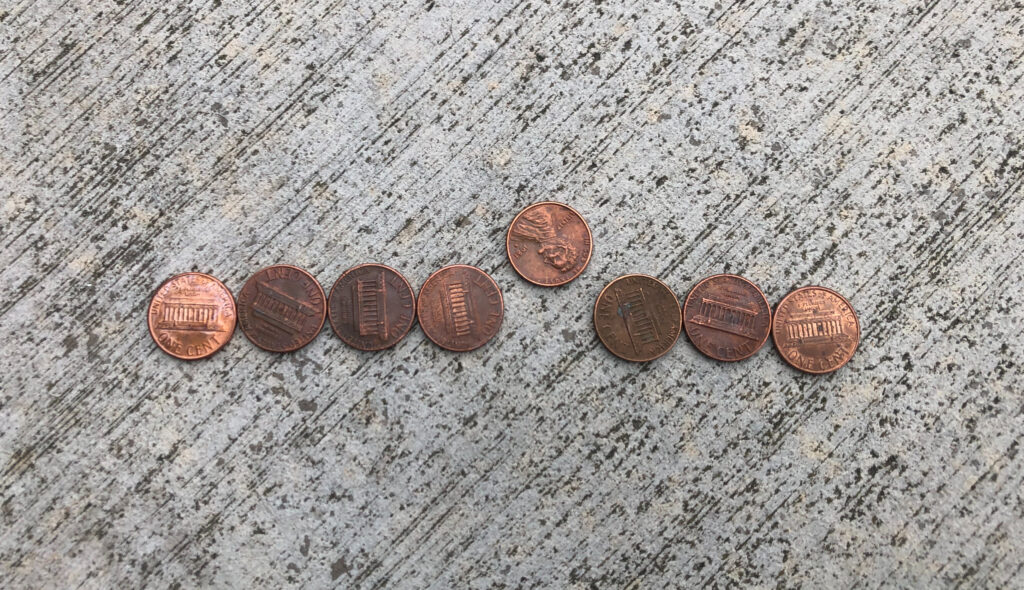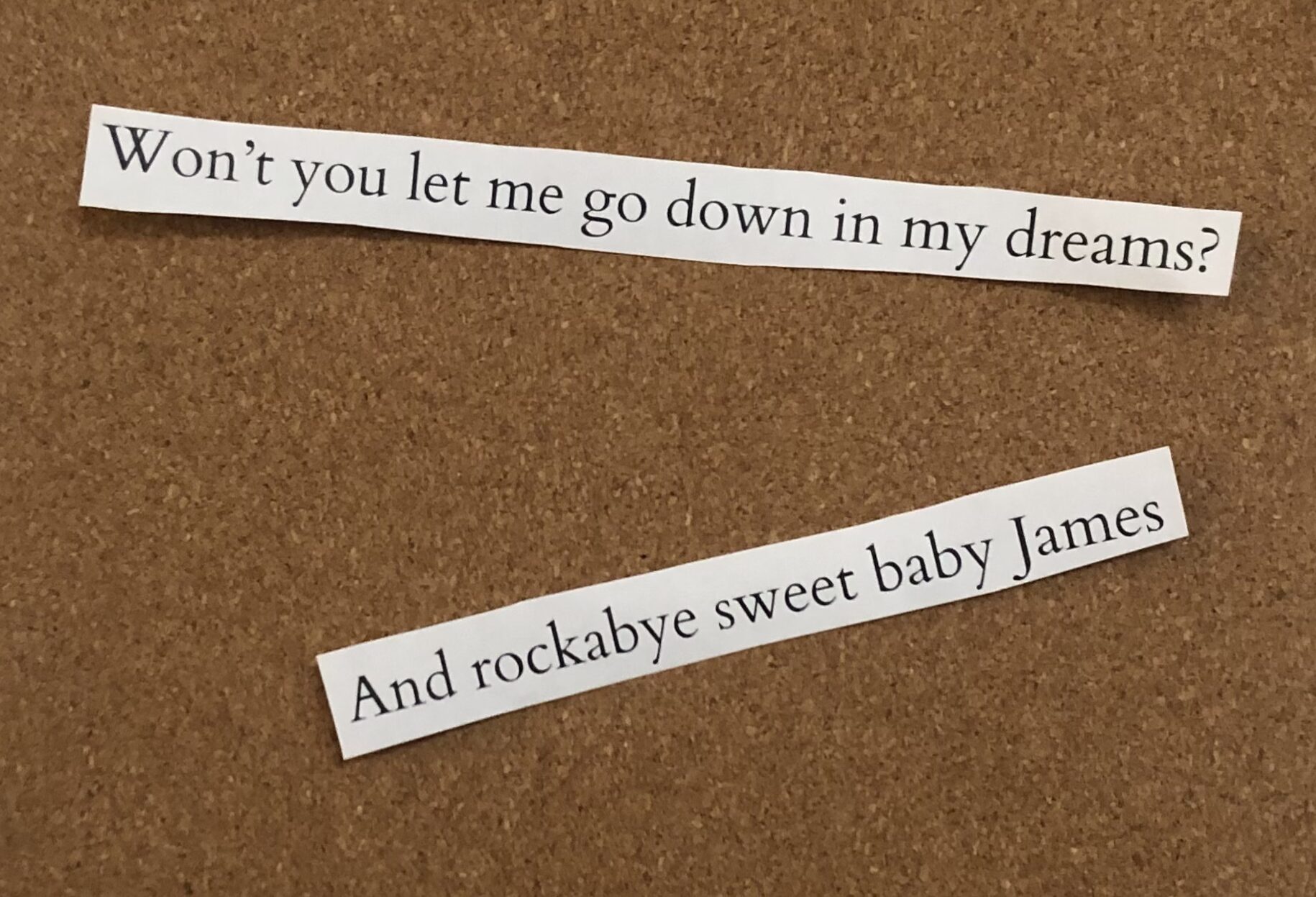Mess of Pennies is a short story that follows a man on his way to his teenage daughter’s choir show and explores the complexities of their relationship.
To write Mess of Pennies, I allowed my imagination and personal experiences to flow into one piece. It is both a representation of what is, and an embodiment of things that could have been.

The afternoon is white. Foggy, but not the blankets that wrap around you and send goosebumps across your skin, just an artless, paper sky. San Francisco has never been known for true winter weather, not that there would be any on the first of December.
With only the plain sky ahead of me, I think of my video call with Felicity a few days ago. It was a bit rushed this week: Lissy is so busy but I try to make sure she talks to her dad for at least an hour every Sunday.
“I haven’t done anything interesting this week,” I admitted. “Spent time with the cats, cooked a bit. Oh, and watched a movie. It was this really well made animation.”
“I’ll have to watch it. If an animated movie impressed you, it must be pretty good. I’ll watch it while I eat, like, five of the biscuits I made this morning. They taste just like the ones we used to make when I was little.”
“Were they buttermilk? That’s what always made them taste so good.”
“Yes, they were! And my family really liked them.”
I sat with that, instead of responding. Her family. Her mom and sister.
“And I’ve been so busy with school, too. Eighth grade is really so much more work, but it’s also nice to be the oldest–so I guess it’s a trade-off. Even my choir teacher is giving homework ‘cause, ya know, the concert on Friday. I mean, she didn’t do that in sixth and seventh grade.” Abruptly, she paused. At first, I thought my computer had frozen. But then she asked, “Do you think you might wanna come to that?”
“Yeah, I’d love to be there.” I said, caught off guard. Then I heard the oven beep from the other room. “Hey Lissy, it’s almost six, and the oven just finished preheating — I have to make dinner. I’m excited to see you Friday though.”
“Bye. See you then,” she smiled as she waved, but her eyes didn’t show the same enthusiasm.
So, tonight, I’ll see Lissy perform. She’ll look older than the last time I saw her in person last July. It’s strange how different she looks every time; her hair longer, her shoes a size bigger, an inch taller. Naturally, I think back to when she was small. Back when Lissy was over multiple days a week, from one morning to the next, until we walked up the block to drop her off at her mother’s. I watched her grow, day by day. We’d make crafts, invent characters, and cook together. At bedtime, I’d sing her to sleep: Sweet Baby James, Blue Shadows on the Trail, Go to Sleep Little Baby. The songs would loop until she drifted off—sometimes, until I did too.
I’m pulled from the soft sting of nostalgia by a tap on my shoulder. An older woman stands beside me, eyes narrowed.
“Sir, please would you move your bag, I’d like to sit.” she insists in a clipped English accent.
As I reach for my bag, my senses sharpens and the mildly putrid smell of Muni buses fills my nose—that’s one thing I don’t miss after moving away from San Francisco. I look at which stop we are at and realize it’s mine. With the woman’s eyes still fixed on me, I grab my backpack and my coffee thermos quickly as I run toward the closing doors. Not quick enough, I accept my fate with a sigh as the bus jerks to a start, nearly spilling my coffee. I stand next to the door for a minute, numerous pairs of eyes glued to my back in response to my sudden movement. But soon enough, the bus stops again.
The bus ride was quicker than I thought it would be, only an hour and forty-five minutes. With some time to kill, I decide I’ll get out my phone and ask it where I can buy flowers. A Safeway is three blocks in the right direction, but I know that Lissy would insist that I buy locally. So I decide to walk four blocks further from the middle school where she’ll perform, to a small flower shop that Google informs me is there.
As I walk, the cold chills my face and leaves me thinking. Tonight I’ll see Lissy’s first eighth grade choir concert. I wonder why, out of all the performances she has mentioned, she finally invited me to this one.
She told me about other choir concerts and how guitarists, some small singing ensembles, and a few soloists perform during the concert.
“After I sing with the choir, I’ll be singing a song by myself. I’ve mostly gotten over my stage fright, but I’m scared that people won’t like it, or that, y’know, my voice’ll crack or something,” Lissy told me early on during the Sunday call.
“Can you stay on pitch?” I ask. She laughed through her nose and nodded. “Then I’ll bet you’re a whole lot better than most middle schoolers.”
I walk into the flower shop, glancing over the vibrant flowers which surround the shop’s four walls and the collection of bouquets in the center of the room. I look for an arrangement which I think Lissy would like. I’m trying hard to decide, before I reluctantly land on a larger bouquet made up of some white and purple, but mostly blue flowers.
I carry the bouquet to the register and pull out the ten dollars I have in my wallet – my only bill after the bus fares.
“Your total is $45.04, with tax,” the cashier tells me plainly. He looks up to see the bill I’m holding and the wide-eyed expression on my face. Cautiously he suggests, “There are some cheaper options to the left.”
“Right. Thank you.” I turn to search the left-bouquets.
A few moments later, I place a humble bouquet of orange carnations in front of the cashier. I hand him the bill and search my wallet for the correct change, but it slips from my hand, spilling a mess of pennies across the floor.
With the fragrant flowers in my hand, I find an empty seat in the auditorium. It’s crowded with people. On my left, another parent sits whose daughter, she tells me, is in the sixth grade choir. On my right sits a student, there to watch a classmate, I assume.
A few minutes pass as I wait for the performances to begin. I start to notice the sickly color of the lights and the voices of other audience members surrounding me. The woman behind me complains to the woman next to her, in a hushed voice, that she can’t see over my head. All around me, people chatter, someone’s breathing twitches the hair on the back of my head, and I just want the performances to start, to be quick, to talk to Lissy.
I consider stepping out and taking a breath, when the lights dim and a speaker amplifies the voice of a woman. She introduces herself as the choir teacher, then explains who will be performing tonight. She finishes her speech, “Thank you for coming to the Winter Concert.”
So the concert begins with the sixth grade choir, then the teacher gives a bit too-long of a speech and the seventh grade choir sings. They’re voices are young and scratchy, but the concert is altogether wholesome. Majority of an hour has passed when the small, selected groups–duos or trios–sing.
Finally, the eighth grade choir walks onto the stage. They begin with a rendition of a classic choral song. The singers in this choir stand tall, their shoulders back and their voices steady.
After three more songs, the singers file off the stage, leaving only Lissy. She centers herself in front of the audience, both her hands on the microphone. Her teacher gives an encouraging nod and the audience applauses gently. She looks among the crowd, seeming to search. Her eyes scan the balcony and over the rows of chairs, until, I think, her gaze lands on me. But she is far enough away that I can’t be sure. Then, her shoulders rise as she breathes deeply and gives a nod to the pianist.
Familiar chords begin to play on the piano, but I can’t quite place the song. Reluctantly, Lissy begins, her voice soft and smooth, “There is a young cowboy, he lives on the range/His horse and his cattle are his only companions/He works in the saddle and sleeps in the canyons/Waiting for summer, his pastures to change.” Sweet Baby James, I realize.
As the verse continues, Lissy’s voice fills the auditorium, and my head with memories. I’m brought back blurrily to years ago when she was still young enough to be sung to sleep: I had put her to sleep hours ago, but she called me from her room down the stairs. When I walked in, she was crying. She told me through broken sobs that she learned about Bigfoot at summer camp that day. I sang her to sleep. The lyrics, over and over until her hyperventilating stopped and her breathing slowed.
Lissy’s voice continues to sound, wringing my fatherhood out before me. “He sings out a song which is soft but it’s clear/ As if maybe someone could hear.”
For hours we’d been creating stop-motion films. All her toys were out and dedicated to creating a short movie in which one of her toys walks around. We built puzzles for the backgrounds and her wooden toys made up the furniture. We’d been at it for hours.
“Now the first of December was covered with snow/ So was the turnpike from Stockbridge to Boston.”
As she got older, she began to cry when she was supposed to go to bed. She didn’t like Meredith, who had started living with me by that point.
She cried for her mom. To leave. To “go home”.
“There’s a song that they sing when they take to the highway/A song that they sing when they take to the sea.”
She sat in front of me on the couch as the sun set through the windows. She was eight years old at that point.
“Lissy, I need to talk to you,” I said.
We had an especially nice dinner. We cooked together. Meredith was cleaning a house a few cities over for the evening. We had split up for a few weeks, but then she was back. Lissy said that the noodles tasted better than normal. To me, they tasted bitter. I felt heavy all day, knowing our visit would end with this.
Excited to hear what I needed to tell her, she moved closer to me, looked up, smiling.
I let out a sigh. “Meredith and I have been doing some talking recently, and we decided that we would be better off in a different house. Outside of San Francisco,” Her smile was gone.
“Why?” She tried to sound assured. But her voice broke.
I couldn’t look her in the eye. “Well, San Francisco is expensive, as you know. It’s hard to live here when I’m in between jobs and Meredith is cleaning houses. And it’s hard to get up and down the stairs with her bad knee,” I told her reason after reason, but a guilt set in knowing none of those were really why we were moving. I couldn’t mention Meredith.
“I’ll still see you once a week,”I tried to assure her, but her eyes were already filled with tears.
“Yeah. That all makes sense,” she said, but she was looking down, trying to hide the tears spilling from her eyes. She said she needed to use the bathroom, but even from the living room I could hear her sobbing quietly.
“A song that they sing of their home in the sky/ Maybe you can believe it if it helps you to sleep/ But singing works just fine for me.”
When the pandemic sent us into lockdown, it had been almost a year since we’d moved. I saw Lissy twice a month for a walk at a park by her house. Eventually, those stopped. Then, we started making weekly video calls, one hour each. When lockdown ended, she only came by every few months.
“Rockabye sweet baby James/ Deep greens and blues are the colors I choose/ Won’t you let me go down in my dreams/ And rockabye sweet baby James.”
The song ends and the audience erupts in applause. Endless voices screech and cheer. Lissy bows. Her choir teacher gives a nod of approval. Lissy looks once again through the crowd. Beaming, showered in the acclamation of strangers, friends, family, her eyes find me. I’m certain this time.





